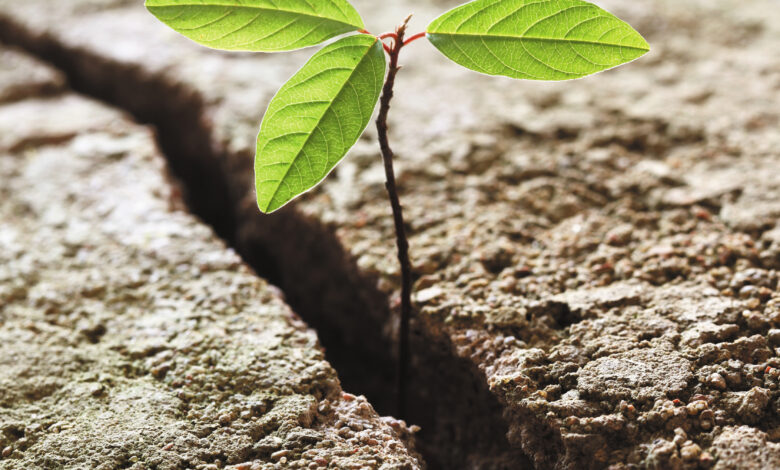Exercise Your Resilience Muscle

 I was recently speaking at a conference in Philadelphia, and while doing a book signing after the presentation, a man walked up, put his hands on the table, looked right at me and said, “Dude, I thought my life was crappy. How do you keep getting back up after you’ve been knocked down?” I wasn’t sure whether to take it as an insult or a compliment, but the question stuck with me—how do any of us get back up when we’ve been knocked down? It is because we are resilient by nature.
I was recently speaking at a conference in Philadelphia, and while doing a book signing after the presentation, a man walked up, put his hands on the table, looked right at me and said, “Dude, I thought my life was crappy. How do you keep getting back up after you’ve been knocked down?” I wasn’t sure whether to take it as an insult or a compliment, but the question stuck with me—how do any of us get back up when we’ve been knocked down? It is because we are resilient by nature.
Resilience is defined as the ability to recover from or adjust easily to misfortune or change. Basically, it’s the ability to get back up after you’ve been knocked down, and I’ve been knocked down my share of times. Raising two children, one with severe mental illness, is challenging, to say the least. Add to that a tumor in my face resulting in facial paralysis, eye surgery, radiation and breaking my foot in four places at the same time … well, that’s one for the ages.
I used to think resilience was in your genetics, like skinny thighs. You either have it or you don’t. But what I’ve come to realize, to appreciate, is that resilience is a set of skills, rather than a disposition or personality type. By learning to cultivate resilience, we not only make it through the hard times that are inevitable, but we grow stronger as a result.
A growing body of scientific research confirms that that resilience is a key factor in helping employees cope with workplace stress. For instance, one study of 744 intensive care nurses found that high resilience was associated with lower levels of burnout and symptoms of anxiety, depression and post-traumatic stress disorder. Another found that employers who work to improve resilience among their employees will develop a more engaged, healthy and productive workforce.
Whether is supporting your members, your staff, or just staying afloat yourself, resilience is a requirement for successful associations.
When you think you have suffered a blow in life that has knocked you down for good, or you think you don’t have what it takes to bounce back, consider this: You can learn to be more resilient at any age, at any time in your life, in any circumstance. Activities that can help you become more resilient include regular physical exercise, stress-reduction practices, programs that actively build executive function and self-regulation skills (think meditation), being more forgiving of yourself and others, and keeping a sense of humor.
We can learn to be more resilient by studying characteristics of resilient people and doing the work to foster those same attributes in our own lives.
Everyone experiences setbacks, sadness, stress, and loss. The people who tend to navigate these challenges more easily share similar characteristics. Generally speaking, they:
- Have a clear vision
- Stay connected and build strong, positive relationships
- Practice mindfulness
- Find humor in the little things and not take themselves too seriously
- Embrace change as an opportunity
- Respond intentionally rather than react emotionally
- Give of themselves to help others
- Consider adversity as a challenge and an opportunity
- Process grief
- Focus on their strengths
- Think optimistically
- View themselves as fighters, not victims
- Have high emotional intelligence (EQ) and cultivate self-awareness
- Learn from their experiences to guide future behavior
- Take care of their mental, emotional, physical, and spiritual health
- Perceive bad times as temporary
- Focus on what they can control
- Avoid complaining, criticizing, and complacency
- Stretch out of their comfort zone and take risks
- Surround themselves with positive people
Think about a time you and/or your association has been down emotionally and you did not necessarily recover as quickly as you would have liked.
Now think about an instance in which you and/or association did rebound and recover quickly.
How do these two examples compare? What made it possible to bounce back? When you examine the differences you can start closing the gaps. Whether it is losing a critical member of your team, experiencing a drop in membership, or a change in the industry, the resilience building strategies are the same.
Think of things that make you feel strong and inspired. Do these things intentionally and often. If listening to music inspires you, then play your favorite tunes and turn up the volume. Listen to the music until you can actually hear it again. In fact, we can often associate a song with a feeling. When we hear the song, dopamine (the feel good neurotransmitter) is released in our brain, making us actually feel happier.
Schedule a pot luck lunch with the team, arrange a happy hour, or simply spend time building relationships with your members.
Your thoughts drive your actions. Your actions become your habits. Resilience is a habit. The key is to make a conscious decision to exercise resilience. Here are few examples of ways to do that:
- Refuse to get overly upset over the little things
- Forgive yourself for mistakes, both little and big
- Remain calm when someone treats you disrespectfully
- Manage stress proactively before an important event
When upheaval strikes, we should consider how we have improved as a result, says Sonja Lyubomirsky, a professor of psychology at the University of California Riverside. As an example, she points to studies showing that women diagnosed with breast cancer found numerous positive emotions, including re-evaluating true priorities and improved self-confidence.
This is also a vital insight for learning to become more resilient for your team, your members, and your association. We achieve strength through struggle. When we make it through a trauma, crisis, or stressful time, we learn something. It is called “post-traumatic growth.” It’s like flexing your resilience muscle. While you don’t usually see the lesson at the time, you are able to look back with perspective and learn from it.
The bottom line is that resilient people don’t let adversity define them. They perceive pain and misfortune as temporary. They don’t waste difficult experiences and difficult times. They use them as a catalyst for growth.
Author Anne Grady is an internationally recognized speaker and author. Anne shares humor, humility, refreshing honesty and practical strategies anyone can use to triumph over adversity and master change. Her new book is “Strong Enough: Choosing Courage, Resilience, and Triumph.” She is also the author of “52 Strategies for Life, Love & Work.” Learn more at www.getstrongenough.com.
Photo credit: Pertusinas/Shutterstock.com




